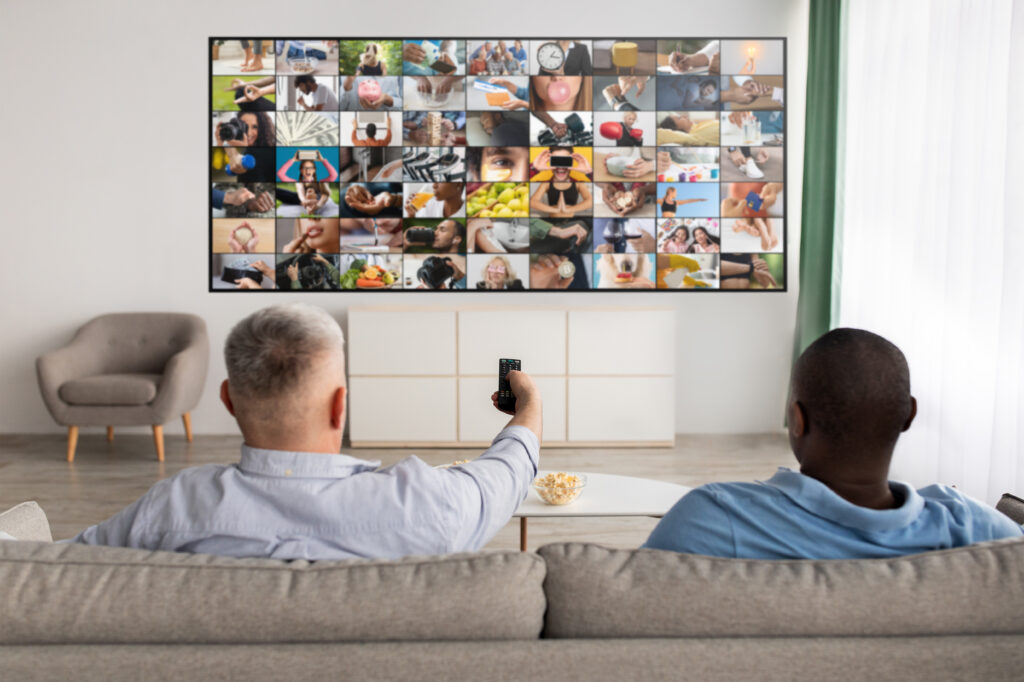In the evolving landscape of smart TVs, the competition is fierce, with Roku TV vs Google TV emerging as two of the most popular choices. When consumers confront the dilemma of 'roku tv vs google tv,' understanding the user experience offered by each platform becomes critical. This article thoroughly compares these two contenders, focusing on overall performance, ease of use, content availability, and unique features.
Overall Performance
Roku TV and Google TV each excel in delivering smooth and reliable performance, but their approaches differ significantly.
Roku TV
Roku TV is synonymous with simplicity and reliability. Its performance is marked by a straightforward interface and effortless navigation, making it accessible to users of all ages and technical proficiencies. One of Roku's standout features is its speed; the platform is optimized to run smoothly even on budget-friendly hardware.
Google TV
Google TV, on the other hand, integrates more sophisticated features driven by Google's powerful AI capabilities. This platform presents a more dynamic interface, enriched with personalized recommendations based on users' viewing habits. However, these advanced features demand higher processing power, which may slightly impact performance on lower-spec devices.

Ease of Use
When evaluating 'roku tv vs google tv,' ease of use significantly influences user satisfaction.
Roku TV
Roku TV prides itself on a clean, intuitive interface that's extremely user-friendly. The home screen is straightforward, with customizable tiles simplifying navigation to preferred streaming services or input devices. The simplicity extends to the remote control, which has minimal buttons, making it easy for all users to handle.
Google TV
Google TV offers an immersive, personalized experience by leveraging Google Assistant and AI technology. Voice search and control capabilities enhance usability, allowing users to find content or control smart home devices effortlessly. However, the initial learning curve can be steeper compared to Roku, particularly for those unfamiliar with Google's ecosystem.
Content Availability
Content is king when it comes to selecting a smart TV platform, and both Roku TV vs Google TV deliver in spades.
Roku TV
Roku TV supports a vast array of streaming services, including all major players like Netflix, Hulu, Amazon Prime, and Disney+. Additionally, it hosts a plethora of free channels, bringing a rich diversity of content to users without additional costs.
Google TV
Google TV also offers robust content availability, including popular streaming services. However, it takes a step further by integrating live TV through YouTube TV, presenting an all-encompassing entertainment hub. Google's approach to content aggregation surfaces personalized recommendations, catering to individual taste for a more tailored viewing experience.
Unique Features
Roku TV
- High Dynamic Range (HDR) Support: Enhances picture quality for a more vibrant viewing experience.
- Universal Search: Allows users to search for content across multiple apps efficiently.
- Private Listening: Connects to the Roku mobile app, enabling users to listen to their TV audio via headphones.
Google TV
- Google Assistant Integration: Facilitates voice search and controls for both the TV and connected smart home devices.
- Personalized Home Screen: Curates content based on user preferences, making it easier to discover new shows and movies.
- Compatibility with Android Devices: Offers seamless integration with Android smartphones and tablets.
Frequently Asked Questions
Which platform is better for beginners?
Roku TV is generally more beginner-friendly due to its simplistic interface and easy setup process.
Which platform offers better integration with other smart devices?
Google TV excels in smart home integration, especially for users within the Google ecosystem.
Do both platforms support 4K streaming?
Yes, both Roku TV vs Google TV support 4K Ultra HD streaming on compatible devices.
Can I use voice control features on both devices?
Yes, while Roku offers voice control on certain models, Google TV's voice control powered by Google Assistant tends to be more advanced and feature-rich.

FAQ: Roku TV vs Google TV
What are the main differences between Roku TV vs Google TV?
Hardware and Content
Roku TV
- Roku TV is typically integrated into smart TVs from a variety of manufacturers such as TCL, Hisense, and Sharp.
- The platform is considered hardware-agnostic, meaning it can be found on different brands of TVs without proprietary hardware limitations.
- Roku offers a vast library of streaming channels and services, including popular platforms like Netflix, Hulu, Disney+, as well as various niche channels.
Google TV
- Google TV is frequently found on select devices, including the latest Chromecast with Google TV, and smart TVs from manufacturers like Sony, TCL, and others.
- Runs on the Android TV operating system but includes a revamped interface.
- Offers access to the Google Play Store, enabling a vast array of apps, games, and content services.
How does the user experience vary between Roku TV vs Google TV?
Interface and Navigation
Roku TV
- Interface: Known for its simplicity and ease of use. The home screen is channel-based, similar to how classic TV interfaces operate, with a grid layout showing all installed apps.
- Customization: Limited customization options; users can rearrange app tiles but have fewer personalization features compared to Google TV.
- Speed: Generally provides a smooth and responsive experience, thanks to the lean design.
Google TV
- Interface: The Google TV interface is more sophisticated and visually rich. It uses personalized recommendations and content aggregation from various streaming services into a cohesive view.
- Customization: Allows extensive customization, including user profiles for personalized recommendations and watchlists.
- Speed: Generally fast, but the richer UI can sometimes lead to perceived slowdowns on lower-end hardware.
Is Roku TV vs Google TV easier to navigate for first-time users?
Roku TV
- Ease of Navigation: Typically easier for first-time users due to its straightforward, channel-based interface.
- Learning Curve: Minimal learning curve; everything is accessible through simple menu options.
- Setup: Quick and simple out-of-the-box setup, often guiding the user through every step.
Google TV
- Ease of Navigation: While powerful and visually appealing, the interface can be somewhat overwhelming for first-time users due to its richer features and content aggregation.
- Learning Curve: Slightly steeper due to the abundance of features and customization options.
- Setup: May require more initial setup steps like Google account integration and configuring personalized recommendations.
When considering 'roku tv vs google tv,' your choice will ultimately depend on your individual preferences and needs. Roku TV shines with its simplicity, ease of use, and broad content availability, making it an excellent option for users who value straightforward functionality.
Conversely, Google TV stands out with its advanced, AI-driven features, personalized recommendations, and superior integration with smart home devices, appealing to tech-savvy users desiring a more customized experience. Both platforms provide compelling entertainment experiences, yet each caters to distinct user priorities—navigating the nuances between them will help you make the most informed decision.




